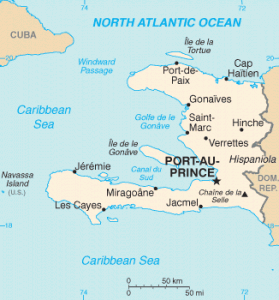The Haiti Ministry of Public Health and Population (MSPP) has reported nearly 15,000 cases of the bacterial disease, cholera during the first ten months of the year, according to a United Nation’s Office for the Coordination of Humanitarian Affairs (OCHA) report published Nov. 25.

The cholera epidemic, which began in Oct. 2010, has grown to 712,330 cases and 8,655 cholera-related deaths. From Jan. 1 to Oct. 31, 2014, the MSPP reports recording 14,869 cases and 132 fatalities.
The report notes that a significant increase in cholera incidence has been observed in metro Port-au-Prince since late September, related to a heavy and delayed rainfall.
Two days ago, Doctors Without Borders/Médecins Sans Frontières (MSF) said more than 2,000 people with symptoms of cholera have required emergency hospitalization since mid-October in Port-au-Prince, Haiti.
The outbreak of cholera began in Haiti in October 2010, months after the devastating 7.0 magnitude earthquake hit the Caribbean country. Numerous organizations, including The Transnational Development Clinic and The Global Health Justice Partnership of Yale law school and L’Association Haïtienne de Droit de l’Environnement, have said that there is ample scientific evidence to show U.N. troops from Nepal inadvertently brought cholera to Haiti in October 2010 and the United Nations should be held responsible.
In fact, several lawsuits in the past couple years have been filed accusing the United Nations of gross negligence and misconduct on behalf of victims of a cholera outbreak in Haiti in 2010. A recent Brooklyn lawsuit alleged the cholera outbreak resulted from “the negligent, reckless, and tortious conduct of the … United Nations; its subsidiary, the United Nations Stablization Mission in Haiti; and its officers… The sickness, death and continual ongoing harm from cholera suffered by Haiti’s citizens are a direct result of the UN’s multiple systematic failures.”
LISTEN: Yale University’s Dr Rosalyn Chan explains the UN links to cholera outbreak in Haiti
Cholera is a bacterial disease that can cause diarrhea and dehydration. Cholera is most often spread through the ingestion of contaminated food or drinking water. Water may be contaminated by the feces of an infected person or by untreated sewage. Food is often contaminated by water containing cholera bacteria or by being handled by a person ill with cholera.
For more infectious disease news and information, visit and “like” the Infectious Disease News Facebook page

